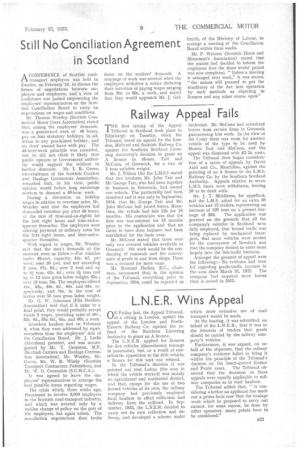Railway . Appeal Fails T HE first sitting of the Appeal Tribunal
Page 39

If you've noticed an error in this article please click here to report it so we can fix it.
in Scotland took place in Edinburgh on Tuesday, when the Tribunal heard an appeal by the London, Midland and Scottish Railway Co. against the Southern Scotland Licensing Authority's decision to grant an A licence to Messrs. Tait and McCann, of Greenock, for a van of 2 tons unladen weight.
Mr. J. Wilson (for the L.M.S.) stated that two brothers, Mr. John Tait and Mr. George Tait, who had been together in business in Greenock, had owned one vehicle. The partnership had been dissolved and it was only in September, 1934, that Mr. George Tait and Mr. John McConn had joined forces. Meantime, the vehicle had lain idle for 18 months. His contention was that the firm was non-existent for 18 months prior to the application and that no claim to have done business had been established for the basic year.
Mr. McConn stated that there were only two covered vehicles available in Greenock. His work would be the conducting of removals and the conveyance of goods to and from shops. There was a demand for more vans.
Mr. Rowand Harker, K.C., chairman, announced that, in the opinion of the Tribunal, everything prior to September, 1934, could be regarded as irrelevant. Mr. McConn had submitted letters from certain firms in Greenock guaranteeing him work. In the view or the Court there was room for another vehicle of the type to be used by Messrs. Tait and McConn, and the appeal was dismissed with £2 2s. costs.
The Tribunal then began consideration of a series of appeals by David Auld and Co., Mauchline, against the granting of an A licence to the L.M.S. Railway Co. by the Southern Scotland Authority. Appeals relative to seven L.M.S. bases were withdrawn, leaving 16 to be dealt with.
Mr. J. T. Middleton, for appellant, said the L.M.S. asked for an extra 39 vehicles and 12 ,trailers, representing an increase of 129 tons on a present ton nage of 293. The application was granted on the grounds that all the company's vehicles in Scotland were fully employed, that horsed traffic was being replaced by mechanical transport, that more vehicles were needed for the conveyance of livestock and that the company desired to enter more largely into the fish-traffic business.
Amongst the grounds of appeal were the following :—No evidence had been led regarding goods-traffic increase in the area since March 31, 1932. The company had acquired more horses than it owned in 1933.




























































































